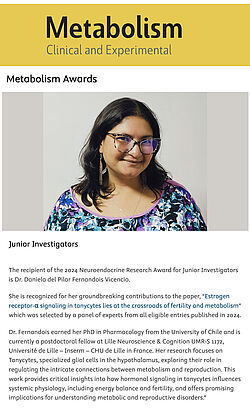Lille Neuroendocrinology
Interactions between hypothalamic neuroendocrine systems and peripheral hormones are increasingly thought to play a fundamental role in postnatal brain development, the impairment of which lies at the origin of several major neurological and psychiatric disorders.
In addition, over the last few years, evidence has been accumulating for the involvement of central neurohormone imbalances in both the pathophysiology of cognitive disorders, such as certain early-onset dementias, and in the pathophysiology of metabolic and reproductive disorders such as obesity and infertility.
Our laboratory examines how chemotropic factors and peripheral hormones (estrogen, leptin, AMH…) impact hypothalamic development and function, as well as the importance of non-neuronal cells (tanycytes, astrocytes and endothelial cells) in this dialogue between the periphery and the central nervous system.
It also aims to evaluate how pathological conditions (obesity, diabetes, etc.) affect these neurobiological events and, conversely, how the alteration of communication between the brain and the periphery makes the organism susceptible to developing such conditions (obesity, diabetes, precocity and/or delayed puberty and infertility).
Agenda
last news
-
-
Daniela Del Pilar Fernandois Vicencio Winner of the 2024 Young Researchers Neuroendocrine Research Award
Lille Neuroendocrinologie Prix et distinction -
-
-
Vincent Prévot receives the 2024 Inserm Research Prize
Lille Neuroendocrinologie Prix et distinction






![[Translate to English:]](/fileadmin/_processed_/e/a/csm_Nadia_Prix_08abb54348.jpg)
